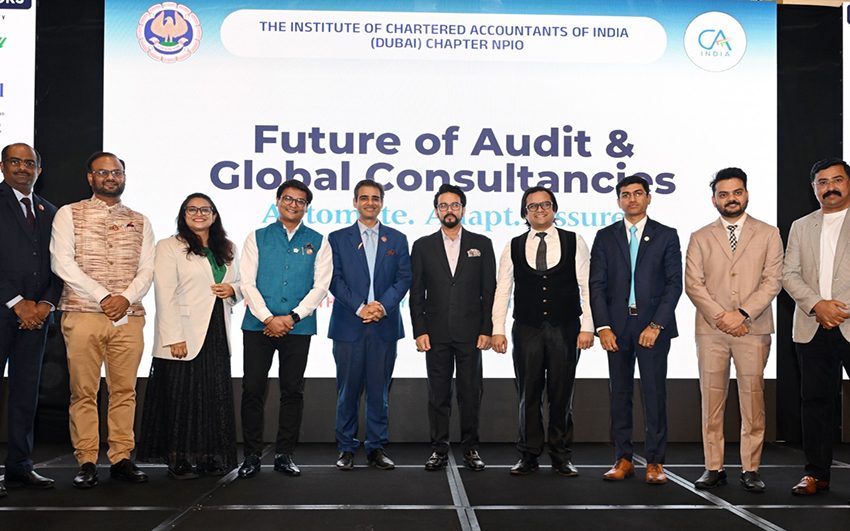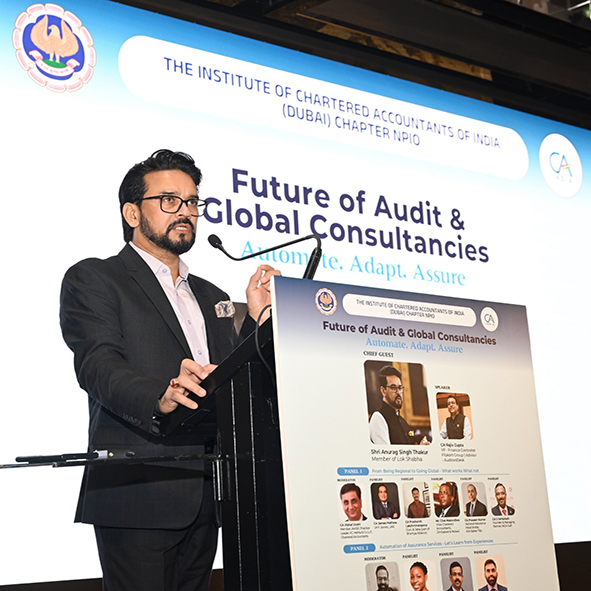Ramadan Evenings Reimagined.. A Refined Iftar Experience at Fairmont The Palm’s Fairuz Garden
India needs to disrupt industries with innovation to become a developed nation by 2047, former Indian Minister tells ICAI Dubai to adopt AI to transform accounting sector

Adoption of innovation and Artificial Intelligence is no longer a choice, but are essential part of business, Anurag Thakur, former Indian Minister of Sports, Youth Affairs and Minister of Information and Broadcasting, says.
Dubai, UAE; September 1, 2025
India’s real GDP has grown 7.8 percent is to ₹47.89 trillion in the first quarter of FY 2025-26, compared to ₹44.42 trillion in the first quarter of FY 2024-25;
India set to become world’s third-largest economy with a GDP of $7.3 trillion by 2030;
The number of taxpayers in India has increased 82 percent from 57 million in 2014-14 to 104 million in 2023-24. Similarly, India’s direct tax receipts increased 182 percent;
India’s AI market to triple to US$17 billion by 2027. Its current domestic AI market is powered by 600,000 trained professionals and it is going to be more than double 1.25 million by 2027;

ICAI is world’s second largest professional body of Chartered Accountants with over 850,000 students and around 415,000 members. ICAI has a wide network with 5 Regional Councils, 175 Branches, 50 Overseas Chapters and 31 representative offices across the globe.
Indian professionals need to accelerate the pace of technology adoption and disrupt the traditional business models in order to become a much stronger global economic power and achieve self-reliance in all fields – especially in accounting, taxation and governance, a senior Indian official told members of the Dubai Chapter of the Institute of Chartered Accountants of India (ICAI).
“We are on a mission to integrate human minds with artificial intelligence, because vision without technology is daydreaming. And technology without vision is chaos,” Anurag Thakur, Member of Parliament and former Indian Minister of Sports, Youth Affairs and Minister of Information and Broadcasting, told ICAI members at a seminar, Future of Audit and Global Consultancies, in Dubai on Sunday, August 31, 2025.
“We have set the target to emerge as a global leader in Artificial Intelligence (AI). Since 2014, strategic initiatives, substantial investments, and a commitment to inclusive innovation have powered the artificial intelligence of India AI to unprecedented heights. Our AI market is set to triple to US$17 billion by 2027. Our present domestic AI market is powered by 600,000 trained professionals and it is going to be more than double 1.25 million by 2027.
“India accounts for 16 percent of total global AI talent pool. Time and tide are in our favour. This is the huge newsbecause our nation is emerging as one of the fastest-growing AI economies globally.”
Jai Prakash Agarwal, Chairman of ICAI Dubai Chapter, lauded the commendable role played by the Indian Chartered Accountants and his fellow members, in his welcome address at the event. Referring to the Indian Government’s vision for self-reliance, he said, India is becoming a global powerhouse in manufacturing and services sector with technology driving its future growth.
“If you want to go global, first go digital by embracing technology to expand faster, expand further, and achieve desired results. So from independence to self-reliance is journey of achieving self-sustenance and resilience. Atamnirabhar Bharat (Self-Reliant India) – the resilient and self-sustained India,” he said.
The Big 4 global accounting firms – Deloitte, Ernst & Young, KPMG, and PriceWaterhouseCoopers (PWC) that collectively employ 350,000 accounting professionals in India – have generated US$4.5 billion in revenue from India last year and they are poised to create US$5.2 billion output in India this year. He urged Indian accounting firms not to chase the Big 4, but to follow India’s global vision to create much bigger global consultancies and scale up their business through technology, innovation, AI, and financial technology (Fintech).
“We are not just here to look back with pride. We are here to look forward with purpose for the era of Big Consulting. An era where India’s firms must no longer be seen as satellites of global brands, but as big consulting houses in their own right, carrying Indian values, technology, and vision into the world,” said the former Cabinet Minister.
Addressing the auditing consulting community, he said, “AI is going to be your biggest power in serving your clients and competing globally. The world keenly watches the idea and innovation of India. I give you the example of ‘JAM’ Trinity – Jan Dhan, Aadhar and Mobile. It revolutionised, digitalised, and modernised our concept of socio-economic welfare.
“Take the example of Unified Payments Interface (UPI), the biggest example of digital disruption of economy. UPI has revolutionised payments with more than 12 billion transactions monthly. India now accounts for 49 percent of global real-time digital payments,” he added.
If India has to achieve its Vision 2047 – to become a Developed Country by 2047 – its birth centenary – then its economy needs to grow at 7.8 percent per year for the next 22 years, according to the World Bank. India’s real GDP has grown 7.8 percent is to ₹47.89 trillion in the first quarter of FY 2025-26, compared to ₹44.42 trillion in the first quarter of FY 2024-25.
“India has become the fourth largest economy of the world. And we are on track to become world’s third-largest economy with a projected GDP of $7.3 trillion by 2030. No wonder if we become the third largest economy much before 2030. In the years to come India will contribute 20 percent of the total global growth,” Anurag Thakur said.
“For the past decade, India under the leadership of the Prime Minister Shri Narendra Modi has been steadily on the path of socio-economic progression, guided by our mantra: Reform, Perform, and Transform.
“Be it empowering women and socio-economically deprived groups, developing infrastructure, introducing fiscal reforms, encouraging start-ups, or supporting research and development, the leadership of our country has a very clear objective. From PM to People, it is our collective dream to make India a developed nation.”
A new World Bank report titled, ‘Becoming a High-Income Economy in a Generation,’ notes that India will need to grow by 7.8 percent on average over the next 22 years to achieve the country’s aspirations of reaching high-income status by 2047.
The report finds that this target is possible. Recognising India’s fast pace of growth averaging 6.3 percent between 2000 and 2024, the report notes that India’s past achievements provide the foundation for its future ambitions. Getting there however would require reforms and their implementation to be as ambitious as the target itself.
“Lessons from countries like Chile, Korea and Poland show how they have successfully made the transition from middle- to high-income countries by deepening their integration into the global economy,” said Auguste Tano Kouamé, World Bank Country Director. “India can chart its own path by stepping up the pace of reforms and building on its past achievements.”
The report evaluates three scenarios for India’s growth trajectory over the next 22 years. The scenario which enables India to reach high-income status in a generation, requires India to: a) achieving faster and inclusive growth across states; b) increasing total investment from current 33.5 percent of GDP to 40 percent (both in real terms) by 2035; c) increasing overall labour force participation from 56.4 percent to above 65 percent; and d) accelerating overall productivity growth.
In the past three fiscal years India has accelerated its average growth rate to 7.2 percent. In order to maintain this acceleration and attain an average growth rate of 7.8 percent (in real terms) over the next two decades, the report recommends four critical areas for policy action – increasing investment, create more and better jobs, promote structural transformation, trade participation and technology adoption, enabling states to grow faster and together.
Anurag Thakur said, “Making India a developed nation is a historic movement of this millennium, and Chartered Accountants must lead it. We have moved from a sluggish to progressive economy, from cash to less-cash and a situation where people files taxes are a contribution towards building the nation.
The number of taxpayers has increased 82 percent from 57 million in 2014-14 to 104 million in 2023-24. Similarly, India’s direct tax receipts increased 182 percent.
“Today, India is home to 1.85 lakh DPIIT-recognised start-ups, generating employment for 17.6 lakh young people. The phenomenal rise in start-ups is driven by a conducive and supportive entrepreneurial ecosystem,” he said.
By 2030 when India will be the third largest economy of the world we will require as many as 10 lakh professionally trained Chartered Accountants.
“The dynamics and dimension of the Indian economy, our trade commerce and industry have completely changed. So, it is time for you to shift from traditional audits to tech-driven, multi-disciplinary solutions. Chartered Accountants are traditionally seen as a business protector. Now it is time to be business enabler,” he said.
“We have approximately 10,244 Fintech entities, which is 3rd largest in the world. All of this shows economy and earning of people are on rise in India and entrepreneurship has become a new norm. It is a high time, and, I sincerely urge ICAI to redefine its role and responsibility in the wake of transformation which India is undergoing. That means ICAI will have more and more clients and compliances to handle. You will be so busy that you will hardly find a moment to catch your breath.
“As far as the ICAI is concerned, you have a significant role to play. India has taken a pledge to become a developed nation by 2047. Therefore, you are not merely in an advisory role but in the driving seat of this great dream of Viksit Bharat 2047.”
ICAI is second largest professional body of Chartered Accountants across the world with over 850,000 students and around 415,000 members. ICAI has such a wide network with 5 Regional Councils, 175 Branches, 50 Overseas Chapters and 31 representative offices across the globe. And among 50 overseas chapters ICAI Dubai Chapter is the largest & most vibrant chapter of ICAI. Of the 8,000 Indian Chartered Accountants active in the UAE‘s private sector, 1,400 are currently leading businesses in senior positions.
The event, participated by more than 200 accounting professionals and dignitaries, was conducted by Rishi Chawla, Vice Chairman of ICAI Dubai. He said, “At a time when AI and automation rewrite the rules, it’s our thinking that will keep us relevant. This event reignited that mindset.”
ICAI Dubai Chapter, established in 1982, is the largest, most active and award-winning chapter among the 54 overseas chapters of ICAI. It has registered a phenomenal growth in membership in recent years and currently has over 3,000 members representing more than 1,550 multinationals and other companies.






